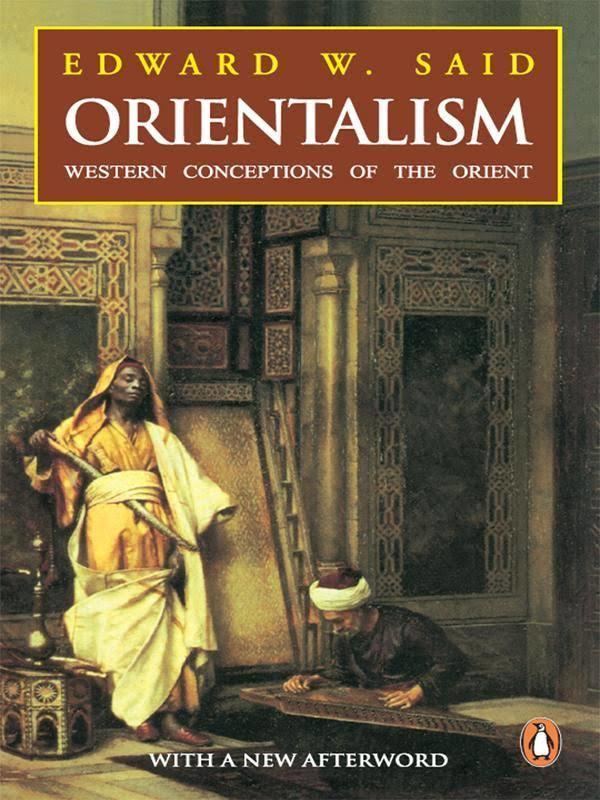
Orientalism: A brief introduction
One of our aims with poco.lit. is to try to demystify some of the core ideas in and around postcolonial studies and the ways in which postcolonial literatures have been read, as we’ve done here and here. In this post, we take a look at Orientalism by Edward Said and some of its key contributions to thinking about colonial practices.
Edward Said, a Palestinian American professor of literature, published Orientalism in 1978, and it is widely regarded as one of the most influential texts for postcolonial studies. In it, Said examines how the colonial powers of France and Britain constructed a notion of the “Orient” and its peoples in the late 19th and early 20th centuries. The “Orient” was, broadly, supposed to encompass regions of North Africa and the Middle East – but in postcolonial studies, many of Said’s observations about the workings of this kind of representation have been found to resonate beyond these particular geographical regions. This is likely related to the fact that Orientalism, as Said describes it, is also a process of flattening the differences within what are in fact enormously heterogeneous spaces. It fabricates a notion in which all “Orientals” are supposedly, in some essential way, the same.
Orientalism constructs an image by way of discourse – through representations in language, in books, in institutions, in art and in any number of cultural practices. It’s important to note that as Said describes them, this “Orient” and the “Orientals” who live in it have no real counterparts in reality; they are a complete (Western) fantasy. But the fact that they are imaginary doesn’t change the fact that they can have very real material consequences, as they did for colonized peoples and colonized lands. The Orientalism Said delineates is both a part of what led to colonialism and the means by which it was justified. As he puts it, “To say simply that Orientalism was a rationalization of colonial rule is to ignore the extent to which colonial rule was justified in advance by Orientalism” (39).
The discourse upon which Orientalism is built is fundamentally concerned with the construction of binary oppositions. This is a term Said takes from linguistics, and it describes the idea that people understand things in terms of what they are not. Orientalism served the construction of the binary opposition of European/”Oriental”. This allowed the European to understand himself (and in this case, it mostly was an assumed him) as everything he constructed the “Oriental” as not being: the European was rational and virtuous etc, because the “Oriental” was neither. And in turn, the “Oriental’s” being neither, allowed the European to understand himself as these things. This is, essentially, the process of othering; the construction of an “us” and a “them”. Of course, these binary constructions were hierarchical: in the worldview promulgated and assumed as universal by Orientalism, it is of course better to be rational and virtuous – and it is better to be European. This constructed superiority then calls for, and justifies, that European colonizers should rule over colonized peoples. In this way, it is, finally, all about power.
The relationship between power and knowledge is essential to what Orientalism does. It constructs the “Orient” and “Orientals” as objects of its knowledge production. Europeans thus presumed the power to know this thing called the “Orient”, to produce what counted as legitimate “knowledge” about it (and the world), and the knowledge they produced about the Orient justified that they should be in a position to produce knowledge about it, and continue to be “authorities” over it.
Many of these problems, and their ramifications, are still in evidence today. Said identifies a number of stereotypes which are still apparent in popular media: they include problematic representations of non-Europeans that entail associations of violence, dishonesty, laziness, and so on. Orientalism constructed the “Orient” as backward and primitive (one of the reasons it needed the help of ‘advanced’ Europeans) – and versions of this narrative of (a lack of) development are very much discernible in the way many people talk about the African and Asian continents. Questions of what counts as “knowledge” are integral to many projects to decolonize universities and curricula. And they are also what make contemporary writing that interrogates colonial epistemology, or knowledge-making, so interesting and exciting – see for instance, ambivalent potential of speculative fiction, Lagoon, and Freshwater.
There are certainly also problems with Said’s Orientalism, which is, after all, hardly hot off the presses. Amongst them, that he recognises neither resistance from within the so-called Orient, nor from within the West. All the same, it is a study that has had a profound effect on the shaping of postcolonial studies, and understandings of how Otherness has been constructed.
